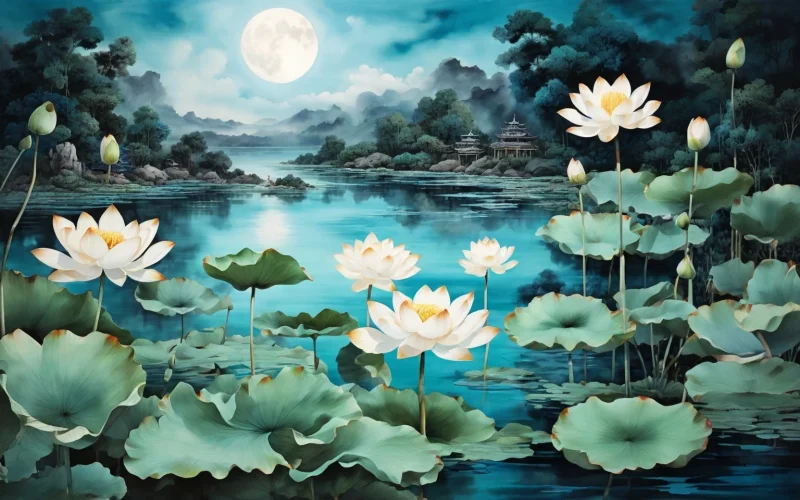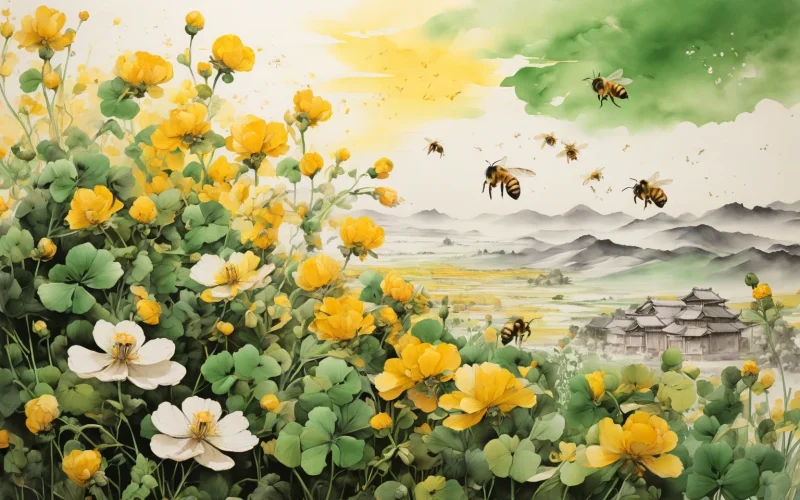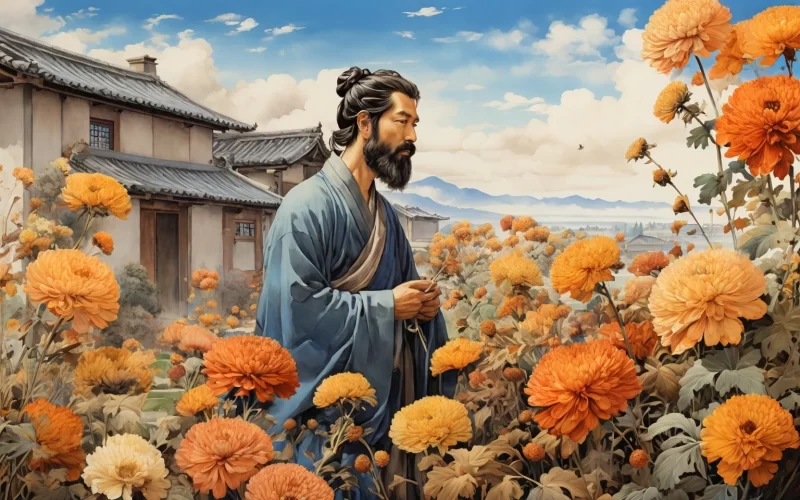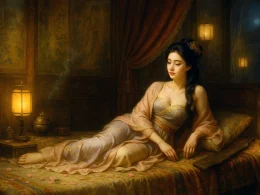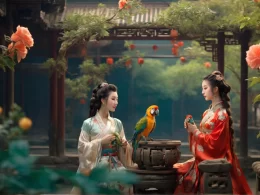White lotus blooms are often outweighed by red flowers;
They'd rather be transplanted before lunar bowers.
Heartless they seem, but they have deep grief no one knows.
See them fall in moonlight when the morning wind blows.
Original Poem
「白莲」
陆龟蒙
素蘤多蒙别艳欺,此花端合在瑶池。
无情有恨何人觉,月晓风清欲堕时。
Interpretation
Composed during the late Tang Dynasty, this poem embodies Lu Guimeng's lifelong frustration—a talented scholar-official who, thwarted by political adversity, retreated to Songjiang as a self-styled "Wanderer of Rivers and Lakes." Through the metaphor of white lotus blossoms, the poem voices his resentment toward personal misfortunes and societal injustice. The pristine yet overlooked lotus symbolizes upright intellectuals marginalized by a world that favors gaudy mediocrity, reflecting not only the poet's plight but also the universal dilemma of virtuous scholars in feudal society.
First Couplet: "素蘤多蒙别艳欺,此花端合在瑶池。"
Sù huā duō méng bié yàn qī, cǐ huā duān hé zài yáochí.
Pure blossoms suffer gaudy flowers' scorn; Such blooms belong where jade ponds are born.
Here, "pure blossoms" (素蘤) embody unadorned virtue, while "gaudy flowers" (别艳) represent superficial brilliance. "Suffer…scorn" (蒙欺) exposes a society that privileges ostentation over substance. The celestial "jade ponds" (瑶池) serve as a biting contrast—what heaven would cherish, earth rejects. This couplet oscillates between indictment (of worldly values) and lament (for unappreciated worth).
Second Couplet: "无情有恨何人觉,月晓风清欲堕时。"
Wúqíng yǒu hèn hé rén jué, yuè xiǎo fēng qīng yù duò shí.
Seemingly heartless, yet aching unseen— In moonlit breeze, it falls, too pure to keen.
The lotus's paradox—"heartless yet aching" (无情有恨)—captures the stoic suffering of the noble. The pre-dawn scene ("moonlit breeze") heightens the pathos of its silent demise. Unlike showy flowers that wilt dramatically, the white lotus perishes with quiet dignity, its grief perceptible only to kindred spirits like the poet. The imagery transcends botany, becoming an elegy for all who are "too good for this world."
Holistic Appreciation
Comprising just four lines with unadorned language and sublime artistic conception, Lu Guimeng uses the white lotus as a metaphor for himself, subtly yet profoundly depicting the circumstances and emotions of a recluse who remains aloof from worldly fame and admires his own virtue. The poet not only critiques society's preference for superficial glamour but also laments the neglect suffered by those who uphold moral purity. The white lotus, which ought to be revered in the "Jade Pond" of celestial beauty, instead drifts alone toward its fall under the "dawn moon and clear breeze"—its quiet sorrow deeply moving. With delicate and refined strokes, Lu transforms melancholy into ethereal beauty, blending critique with poetic elegance, fully revealing the depth and sensitivity of late Tang literati's inner world.
Artistic Merits
- Floral symbolism with profound meaning: The white lotus represents unrecognized talent of noble character, mirroring the poet's own identity.
- Precise parallelism and exquisite phrasing: The poem's strict couplet structure flows naturally with emotion.
- Elegant diction and transcendent imagery: Phrases like "dawn moon and clear breeze" and "on the verge of falling" evoke a faint desolation and refined grace.
- Irony intertwined with lament: It critiques social injustice while conveying the poet's solitary pride and indignation.
Insights
More than a nature poem, this is a lyrical realist work. It reveals how truly virtuous and capable individuals often refrain from self-promotion and are overlooked for refusing to conform. In modern society, we must uphold integrity while daring to assert ourselves. Reading this poem today still prompts reflection: Must true worth always be recognized, or is there merit in steadfastly preserving one's character in solitude? This unwavering commitment to ideal virtue is the most poignant and profound essence of The White Lotus.
Poem translator
Xu Yuan-chong (许渊冲)
About the Poet

Lu Guimeng (陆龟蒙 ?– c. 881 CE), a native of Suzhou, Jiangsu, was a Late Tang dynasty writer and agronomist. After failing the imperial examinations, he retreated to a reclusive life in Puli, Songjiang. He formed a famous literary partnership with the poet Pi Rixiu, and the pair are often referred to collectively as "Pi-Lu." His poetry is known for its social satire and a style that is incisive yet subtly restrained. His inclusion in the Biographies of Talents of the Tangunderscores his significance. The modern writer Lu Xun famously praised his essays, noting that they provided "a sharp radiance piercing through a world of muddle". Lu Guimeng is regarded as a uniquely distinctive voice in the literary scene of the late Tang.






